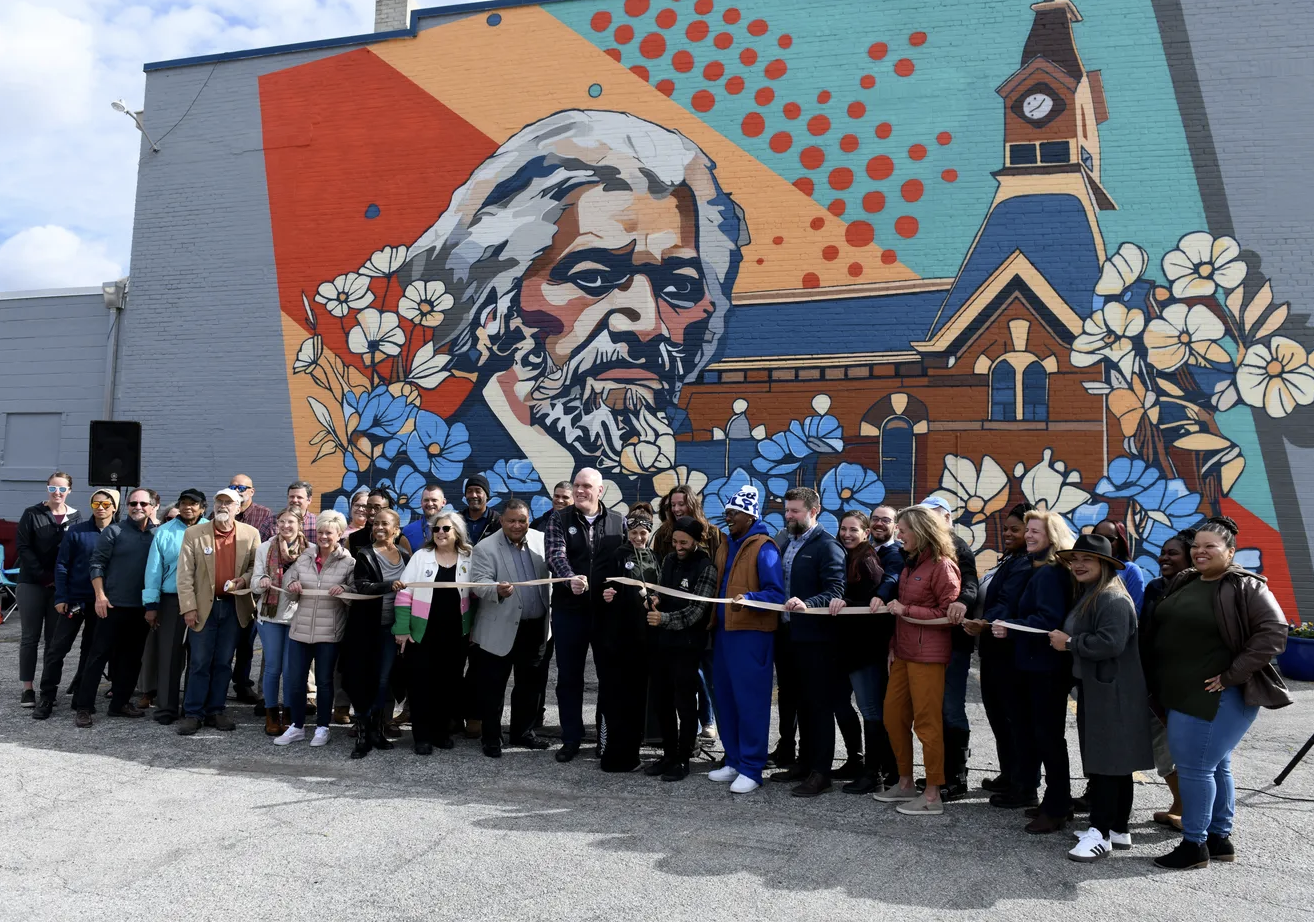
Frederick Douglas
Heritage
History Retold.
Location: Salisbury, MD
Art Design: Brandon Bell + Deserea Martin
Muralists: Brandon Bell + Deserea Martin + Kayla Allen + Kyle St. Peter + Shykiem Handy
Tasks: Creative Direction + Branding+ Mural Design + Installation
Application: Spray
A first of it’s kind for us.
This work is much more than a piece of beauty. It is a piece of HIStory!
Before we begin with this epic project tale, we want to start off by giving a huge thanks to someone new we brought in to accomplish this momentous install.
Everyone, meet Shykiem!
As with most of the artists we bring on, Shy didn’t have experience creating large artwork nor using spray paint as an application.
So to get him up to speed we brought him in to learn first hand in the moment and on the spot!
Understanding the Roots
Frederick Douglass (c. February 1818 – February 20, 1895) was a prominent American social reformer, abolitionist, orator, writer, and statesman. Born into slavery in Talbot County, Maryland, his given name was Frederick Augustus Washington Bailey. He was separated from his mother early and never knew his father. At the age of about 12, his owner's wife began teaching him the alphabet, despite the prohibition against educating enslaved people. Douglass continued to learn secretly and eventually taught himself to read and write.
In 1838, Douglass escaped from slavery by disguising himself as a sailor and using borrowed identification papers. He fled to New York City and later settled in New Bedford, Massachusetts, with his wife, Anna Murray, a free black woman he had met in Baltimore.
Douglass quickly became involved in the abolitionist movement. He began attending meetings of the Massachusetts Anti-Slavery Society and soon became a regular speaker. His powerful oratory and eloquent writing gained him national fame. In 1845, he published his first autobiography, "Narrative of the Life of Frederick Douglass, an American Slave," which became a bestseller and a key text in the abolitionist movement.
To avoid recapture following the publication of his book, Douglass traveled to Ireland and Britain, where he continued to speak out against slavery and raise funds for the abolitionist cause. His British supporters eventually purchased his freedom, allowing him to return to the United States in 1847 as a legally free man.
Douglass founded the abolitionist newspaper "The North Star" and continued to write and speak against slavery. During the Civil War, he was an advisor to President Abraham Lincoln and advocated for the enlistment of African American soldiers in the Union Army. After the war, Douglass fought for the rights of freed slaves and women's suffrage.
Douglass held several important positions in the government, including U.S. Marshal for the District of Columbia and Minister Resident and Consul General to Haiti. He continued to be an influential voice for civil rights until his death in 1895.
Frederick Douglass's legacy endures as a symbol of the struggle for freedom, equality, and justice. His writings and speeches continue to inspire and educate people around the world.
On the evening of February 24th, 1880, Frederick Douglass gave a lecture based on his 1859 "Self Made Men" speech. This speech extolled the virtues of self-reliance and personal responsibility, and it was widely celebrated and requested throughout his speaking career. This was given at the newly built Wicomico County Courthouse. Tickets were sold for 50 cents each from February 15th up to the 23rd, with the proceeds to benefit the John Wesley Methodist Episcopal Church, today known as the Chipman Cultural Center. The money raised was used for the restoration of the church, which was originally built in 1838, and to add a second story.
"Self-Made Men" (Excerpt)
"There is no such thing as a self-made man. We are made up of thousands of others. Everyone who has ever done a kind deed for us, or spoken one word of encouragement to us, has entered into the make-up of our character and of our thoughts, as well as our success."
Why should I care?
If you are an eastern shore native, we think some of these facts below will be of great benefit for you to know:
Frederick Douglass holds significant historical importance, and his legacy is particularly relevant to people in Salisbury, Maryland, and beyond for several reasons:
Local Connection: Douglass was born in February 1818 on the Eastern Shore of Maryland, not far from Salisbury. His early life in this region is an integral part of his story, connecting the local history of Salisbury to his remarkable achievements.
Historical Significance: Douglass was a leading figure in the fight against slavery and for civil rights. His eloquence, activism, and writings brought national attention to the injustices of slavery. His efforts were crucial in shaping the conversation around human rights and equality.
Inspiration: Douglass's life story—from enslavement to becoming a leading abolitionist, writer, and orator—is a powerful example of resilience, courage, and the pursuit of justice. His achievements can inspire individuals to stand up for their own rights and the rights of others.
Education and Awareness: Understanding Douglass’s contributions helps preserve the history and lessons of the past. For local communities, especially those close to his origins, this knowledge fosters a deeper appreciation of their regional history and the ongoing impact of Douglass's work.
Cultural Heritage: Douglass's legacy is a vital part of African American history and American history as a whole. For communities like Salisbury, recognizing and celebrating this heritage contributes to a fuller, more inclusive understanding of their local and national history.
All in all, Frederick Douglass's life and work are not only a source of pride for Salisbury but also serve as a reminder of the enduring struggle for justice and equality that continues to resonate today.
This project was made possible thanks to…
Thank you Beach to Bay Heritage Area for approaching us with this amazing opportunity and thank you Perdue Farms for allowing the use of your training center located in Salisbury, MD to be the home of this amazing piece of art which will be enjoyed by the community for years and years to come!





